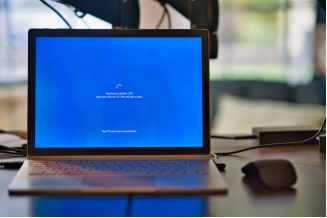7 Tips for Maintaining Your Computer's Performance
In today's digital age, our computers have become an integral part of our daily lives. From work-related tasks to personal entertainment, we rely on these machines for many purposes. But what happens when our trusty computer starts slowing down, freezing, or displaying other frustrating issues? It's time to roll up our sleeves and give our computers a little TLC.
In this guide, we'll explore some invaluable tips to help you maintain your computer's performance. Whether you're a tech guru or a casual user, these strategies will help you keep your computer running smoothly, preventing the need for frequent visits to computer repair shops near you. Let's dive in.
1. Keep Your Computer Clean
Maintaining a clean computer is essential for its optimal performance. Dust and debris can accumulate inside your computer. This can result in it overheating and slowing down. Regularly clean the exterior of your computer using a soft, lint-free cloth. When cleaning the interior, switch off your computer and unplug it to avoid electrical hazards. Carefully remove the computer's casing and use compressed air to blow away dust from the internal components, especially the fans, heat sinks, and power supply unit. Be gentle to prevent any damage.
Additionally, don't forget to clean your peripherals, such as the keyboard and mouse, as they can also accumulate dirt and grime over time. By keeping your computer and peripherals clean, you can ensure better airflow, lower temperatures, and prolonged hardware life, all of which contribute to a smoother computing experience.
2. Install Antivirus Software
Installing reliable antivirus software is crucial for safeguarding your computer against malware, viruses, and other online threats. Ensure your antivirus software is up-to-date and set to run regular scans. This software helps detect and remove harmful programs that can slow down your computer and compromise your data.
Moreover, modern antivirus solutions offer real-time protection, blocking threats before they can harm your system. They also include features like firewall protection, phishing detection, and performance optimization, further enhancing your computer's security and overall performance. Regularly updating your antivirus software ensures it can effectively combat new and emerging threats.
3. Update Your Operating System
Regularly updating your operating system is vital for computer maintenance. These updates typically contain security fixes, bug repairs, and performance improvements. Set your computer to receive automatic updates if possible, or manually check for updates from your operating system's settings. Keeping your OS up-to-date ensures that your computer functions smoothly and remains protected from emerging security threats.
By staying current with the latest updates, you'll also benefit from new features and improved compatibility with software and hardware, ultimately enhancing your computer's overall performance and longevity. Make it a habit to periodically check for updates to keep your system optimized and secure.
4. Manage Startup Programs
Managing startup programs can significantly impact your computer's performance. When your computer boots up, various programs may launch automatically, consuming valuable system resources. To optimize startup, access your computer's task manager or system settings. Review the list of programs set to start with your computer and disable those you don't need immediately. This reduces the strain on your system, resulting in faster boot times and improved overall performance.
By trimming down your startup programs, you'll not only enjoy quicker access to your desktop but also free up system resources for the tasks you prioritize. It's a simple yet effective way to keep your computer running smoothly.
5. Clear Temporary Files
Temporary files accumulate on your computer over time and can consume precious storage space. These files are created during regular computer use and can be safely deleted. To clear them, use the built-in disk cleanup utility on your operating system. This tool will identify and remove unnecessary temporary files, freeing up disk space and potentially improving your computer's speed.
Regularly clearing temporary files is like giving your computer a breath of fresh air. It not only increases available storage but also helps your system run more efficiently, ensuring your tasks are completed without unnecessary delays.
6. Monitor Resource Usage
Monitoring your computer's resource usage is essential for identifying performance bottlenecks. Your operating system provides tools to track CPU, memory, and disk usage. By regularly checking these metrics, you can pinpoint which applications or processes are consuming excessive resources. This information allows you to take corrective action, such as closing resource-heavy programs or upgrading hardware, to maintain optimal performance.
Resource monitoring is your computer's health check. It lets you address issues before they become major problems, ensuring a smoother and more productive computing experience. Stay in the driver's seat of your PC's performance!
7. Defragment Your Hard Drive
Over time, data on your hard drive can become fragmented, i.e., the files get stored in non-contiguous clusters. This fragmentation can cause delays in accessing data. To address this, use your computer's built-in defragmentation tool. This tool reorganizes your files for more efficient storage, improving data retrieval speed. However, note that this is less of an issue for modern solid-state drives (SSDs), which don't benefit from defragmentation in the same way as traditional hard drives.
Defragmentation can breathe new life into older hard drives, but if you're using an SSD, remember that it works differently. Regular maintenance ensures your computer keeps pace with your demands. Be a performance pro!
Get Reliable Repairs From NWA Cell Phone Repair
By following these ten tips, you can proactively maintain your computer's performance, preventing common issues and ensuring it runs smoothly. Remember, regular maintenance can extend your computer's lifespan and reduce the need for costly computer repair services.
However, should you encounter any severe issues or require professional assistance, consider NWA Cell Phone Repair, your trusted partner in computer repair in Washington County and Eureka Springs. Their expert technicians can address a wide range of computer problems, including laptop LCD repair, ensuring your device stays in top shape.
Reach out to them for computer repairs.







Comments
Post a Comment